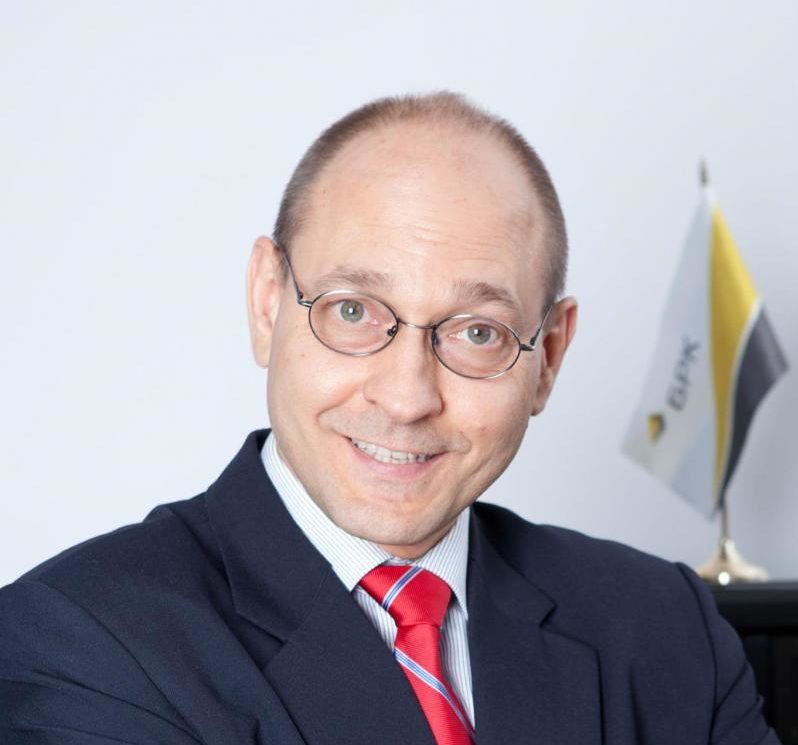ASTANA – The Astana International Financial Centre (AIFC) Academic Council is developing a broad pool of financial, legal and HR professionals to help to shape the centre’s success and the sustainable economic development of Kazakhstan and the region. Plans are also afoot to educate experts in governance and ICT.
“First of all, let me talk about university-level education. Not everybody will go for a university degree, because not everybody in society needs a university education. What people need are relevant skills given the current and future needs in the local and global business environment,” said academic council chair and professor of strategic foresight at IE Business School Alexander Van de Putte in an exclusive interview with the Astana Times.
The fourth industrial revolution, which leverages the Internet, is an important trend.
“The growth of global data flows has been exponential. The driver of the first, second and third industrial revolutions were natural resources, but now the future is data. Thus, the blended learning method is an important trend today. With the growth of the Earth’s population, we are going to have more than 2.5 billion university students. In order to give them a quality education, technology is going to be an important factor to deliver education to where it is needed at the right cost, quality and time,” he noted.
Professional qualifications and the commitment to life-long learning are equally important.
“We partner with a variety of professional bodies, such as the Association of Chartered Certified Accountants (ACCA), the Chartered Financial Analyst Institute (CFA Institute) and the Chartered Institute of Securities & Investments (CISI). In our fast-paced and increasingly interconnected global business environment, relevant professional skills, Continuing Professional Development (CPD) and a commitment to life-long learning are crucial to success,” he added.
The academic council must also focus on developing the well-rounded professional and accountable leadership.
“Accountable leaders make decisions in the face of uncertainty and are able to communicate – both verbally and in writing – a well-structured and logical argument. This also requires not postponing anything to the next day, replying to emails in a timely way, being on time for meetings and making decisions that help improve the long-term prospects of companies, not personal agendas,” he added.
Van de Putte cautioned about not forgetting about the power of the apprenticeship. Professional qualifications do not replace experience and experience does not replace professional qualifications; they go hand in hand.
“At the AIFC Bureau for CPD, we are trying to do something similar. We have developed a portfolio of professional qualifications, which is combined with apprenticeships to ensure business relevance. We focus on the area of specialisation and combining it with professional qualifications,” he said.
Kazakh professionals, similar to those in many emerging markets, face the same career development challenges.
“People tend to focus on the hard skills. Today, however, professional success is not only driven by IQ, but also EQ. Emotional intelligence (EQ) is about the ability to communicate, to listen, to collectively solve a complex problem and to deal with uncertainty. At the bureau, we are trying to develop people as well-rounded professionals; it’s not just about them being knowledgeable, but about being leaders as mentioned earlier,” he said.
Centre students take five leadership courses through Coursera, an online system, focusing on leadership, working in teams, team building and understanding oneself.
“It is not about factual knowledge, but also about the softer skills and how to deal with them in ambiguous situations. I try to teach my students that they have to deal with the fundamentally different world and as result, they need to have both a compass and radar,” said Van de Putte.
“The participants of our programmes need to apply to the professional institution, such as CISI or ACCA. At the same time, they also apply to us for the conditional grant programme. There are a number of conditions required for our applicants before applying for a conditional grant. The AIFC Academic Council makes all decisions to be awarded a conditional grant and the AIFC Academic Council also decides whether the conditions have been met,” he added.
The academic council consists of six AIFC representatives and, as its chair, Van de Putte signs the grants, but “it doesn’t mean that I make the decisions on my own.”
“There are always two council members who conduct the interviews. In the interviews, we are focused not just on IQ, but also on EQ, because we want to develop a pool of professionals. We take a positive approach to people development, including awarding conditional grants,” he said.
“Most of the people that came to interview with us have actually received a conditional grant. That is substantially more than 50 percent. The key is that we want to develop a broad pool of financial, legal, HR (and in the future, governance and ICT) professionals to help to shape the success of the AIFC and also the sustainable economic development of Kazakhstan and the region. That is our aim,” he added.


